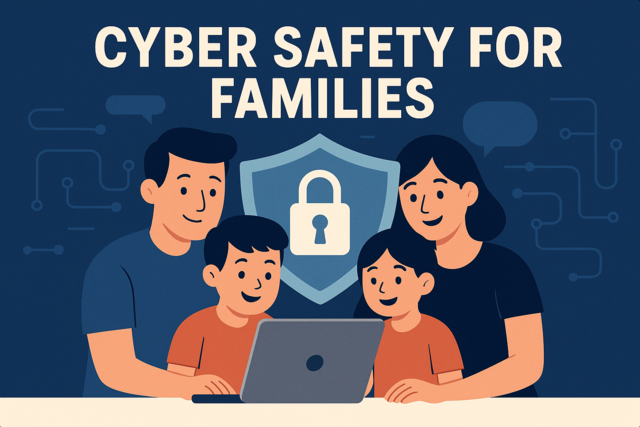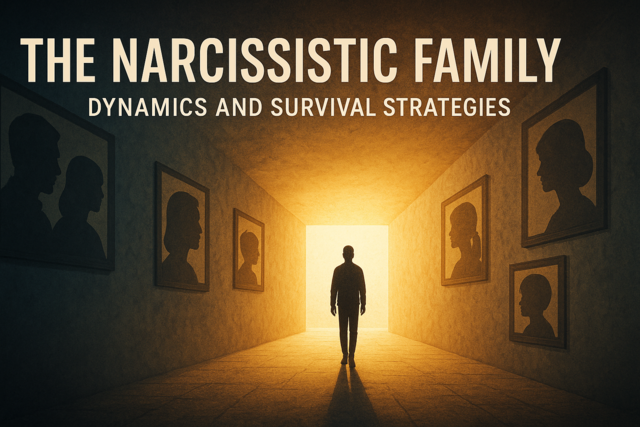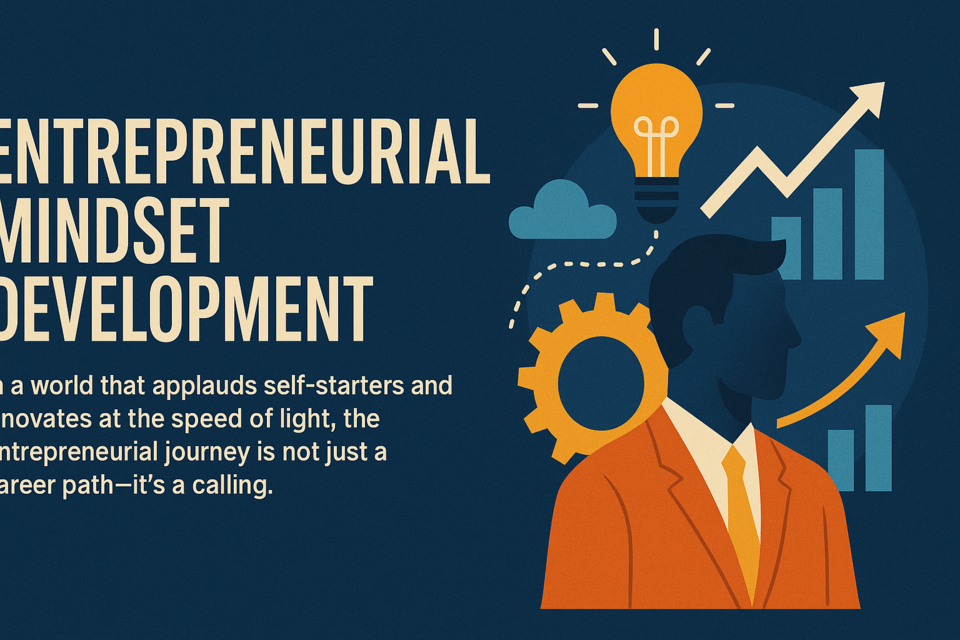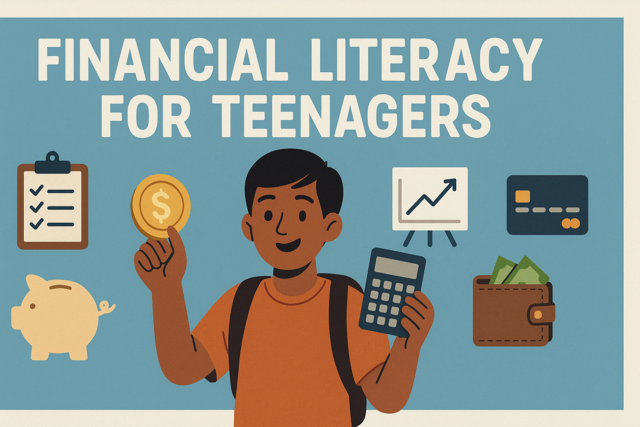Online Class: Generational Patterns — How Narcissism Perpetuates Dysfunction

no certificate
with CEU Certificate*
-
15Lessons
-
22Exams &
Assignments -
5Hours
average time -
0.5CEUs
Course Description
In a world where the echo of narcissism seems to reverberate through every social media post and celebrity headline, understanding and addressing these dynamics has never been more crucial. Welcome to "Generational Patterns: How Narcissism Perpetuates Dysfunction," a transformative journey that invites you to delve deep into the heart of what perpetuates narcissistic traits, not just in individuals, but within entire family systems.
Imagine living in a world where communication thrives on empathy rather than ego--a world where emotional connection replaces validation-driven interactions. This course offers you the keys to unlock such a future. You've likely felt the sting of self-promoted success stories and the emptiness of materialistic dreams. Here, we challenge these societal norms, teaching you how to dismantle their power over your life and create an environment that nurtures authentic expression over hollow accolades.
At its core, this course centers on the belief that true transformation begins from within, radiating outward to touch every aspect of your life. The myth of Narcissus is not just an ancient tale but an allegory of today's reality, mirroring generations caught in cycles of dysfunction. Here, you'll embark on a deep dive into the labyrinth of familial patterns, armed with the understanding and insights needed to break free from their grip.
How do childhood attachment styles influence adult narcissistic traits? Picture a young child whose emotional bonds with caregivers shape their entire world. This course unpacks fundamental attachment theories, revealing how insecure attachment can evolve into narcissistic behaviors that echo through generations. Yet, it is also a story of hope: a narrative of how conscious efforts, self-awareness, and education can rewrite this script, weaving new patterns of compassion and self-worth.
It's time to question and transform the narratives handed down by generations before you, especially those shadowed by Narcissistic Personality Disorder (NPD). With newfound clarity, you'll learn to identify and navigate toxic family roles--those insidious labels like 'golden child' or 'scapegoat' that skew self-worth and create rivalry. Through therapeutic interventions, boundary-setting, and self-empowerment, you will learn to step out from these shadows, fostering authentic connections that nurture empathy and equality.
This course is not merely an academic endeavor; it's a personal revolution--a stepping stone toward recovering from narcissistic parenting and abuse, and a guide to finding your own voice amid the clamor of imposed expectations. You'll discover the profound strength found in vulnerability, in rewriting your family narratives with resilience and joy.
As we journey together, we'll explore the interplay between societal influences and personal growth. You'll be empowered to redefine personal fulfillment, stepping away from societal validation. Understanding these dynamics is the first step to dismantling them--moving from a world of external approval to one of inner satisfaction and genuine self-actualization.
Imagine influencing the generations to come, not with the same patterns of dysfunction, but with resilience, self-worth, and genuine connection. This course promises not only to educate but to inspire you to take tangible steps toward rebuilding your self-identity beyond narcissistic conditioning, creating a lasting legacy of positive change.
This isn't just another online course. It's an experience--a heartfelt journey designed to equip you with the tools, insights, and determination needed to transform your life and the lives of those around you. With a community of fellow learners, all committed to breaking these cycles, you will walk away not only with knowledge but with hope, confidence, and a renewed sense of purpose.
Enrolling in this course means choosing a path of empathy over ego, of understanding over judgment. It invites you to be a beacon of change in a world desperate for compassion and connection. Join us, and transform narratives not just in your family, but for future generations. The time for change is now--are you ready to begin your transformative journey?
- Completely Online
- Self-Paced
- 6 Months to Complete
- 24/7 Availability
- Start Anytime
- PC & Mac Compatible
- Android & iOS Friendly
- Accredited CEUs

Course Lessons
Lesson 1. Empathy Over Ego: Transforming Narcissistic Traits Through Understanding
The lesson examines how various influences, including those found on social media and in celebrity culture, shape societal norms towards narcissism, translating self-promotion and materialism into markers of success. It emphasizes the crucial role of familial environments and parenting in either fostering or mitigating narcissistic tendencies, highlighting the power of empathy and open communication in breaking intergenerational patterns.Lesson 2. Narcissism Across Generations: A Deep Dive into Family Patterns
The Narcissus myth encapsulates narcissism's essence, which manifests not only in individuals but reverberates through family systems, perpetuating dysfunction through validation-driven environments lacking emotional connection. Overcoming this cycle requires self-awareness, boundary setting, empathy cultivation, and education, encouraging families to prioritize authenticity and compassion, breaking historical patterns for future generations.Lesson 3. The Deep Influence of Childhood on Narcissistic Development
Childhood attachment styles profoundly influence the development of narcissistic traits through the nature of emotional bonds formed with caregivers, as explored in foundational attachment theory. Insecure attachment styles such as anxious, avoidant, and disorganized can lead to narcissistic behaviors in adulthood, perpetuating a transgenerational cycle that requires conscious efforts to interrupt.Lesson 4. Disrupting Dysfunctional Dynamics in Families
Narcissistic Personality Disorder (NPD) is a complex condition marked by excessive admiration-seeking, lack of empathy, and generational impact. Understanding its origins—from genetics to environmental influences—and addressing it through therapy can break cycles of dysfunction.Lesson 5. Breaking the Cycle: Healing from Narcissistic Parenting
Narcissistic parents may project their ambitions onto their children, ignoring the child's individuality, causing them to internalize conditional love and become approval seekers. Through education and therapy, individuals can break free from these patterns, fostering personal empowerment and redefining relationships beyond narcissistic legacies.Lesson 6. Navigating Toxic Family Roles: Embracing Empathy and Self-Worth Beyond the Shadows
Narcissistic parents often assign roles like 'golden child' and 'scapegoat' to manipulate family dynamics to their advantage, fostering sibling rivalry and long-lasting impacts on self-worth. Healing involves recognizing these roles and employing therapy and boundary-setting to transcend the dysfunctional cycle.Lesson 7. Empowerment Through Neuroscience
Redefining personal fulfillment away from external validation enables authentic self-actualization, particularly for those escaping narcissistic conditioning. By pursuing passion-driven activities, individuals cultivate resilience and joy, marking a shift from societal approval to inner satisfaction.Lesson 8. Surviving the Narcissistic Web
Narcissistic abuse encompasses manipulative behaviors that foster self-doubt and emotional dependency, demanding victims to navigate through a quagmire of oscillating criticism and adulation. Breaking free from these cycles involves recognizing these patterns, setting boundaries, and seeking professional therapy to reclaim self-worth and reshape one's identity.Lesson 9. Navigating Narcissistic Family Dynamics: Strategies for Resilience and Empowerment
Narcissistic traits are perpetuated across generations through parenting styles that either inflate a child's ego or neglect their emotional needs. Understanding these patterns and strategically setting personal boundaries can transform dysfunctional family dynamics.Lesson 10. Healing Narcissistic Patterns in Family Relationships
Narcissism often arises from a mix of genetic factors and childhood environment, influencing family dynamics deeply. Breaking these cycles demands awareness and developing empathy and communication within families, promoting healthier interactions and emotional safety.Lesson 11. Unraveling the Influence of Narcissism in Media: A Journey Through Time
Narcissism, originating from Greek mythology, illustrates the dangers of self-obsession and has evolved through history in media portrayals, impacting societal values. Educational insight into these patterns empowers students to challenge and transform generational cycles of dysfunction towards collective empathy.Lesson 12. Healing the Past: Transforming Family Trauma into Resilience
Understanding narcissistic influences and addressing patterns of generational trauma pave the way for healthier familial interactions and emotional resilience. Through professional guidance and self-awareness, individuals can rewrite family narratives, fostering legacies marked by unity and compassion.Lesson 13. Healing Generational Patterns: Therapeutic Interventions for Narcissistic Families
Narcissistic families assign roles that reinforce the narcissist's self-image, negatively impacting children's development and self-worth. Therapy and education can transform these roles, fostering empathy, authenticity, and resilience in future generations.Lesson 14. Shifting from External Validation to Self-Acceptance
Generational patterns of dysfunction intertwine with narcissistic conditioning, where love becomes conditional and self-worth is linked to external achievements. Understanding and breaking free from these patterns through self-awareness and resilience opens pathways to authentic self-identity and healthier relationships.Lesson 15. Resilience Redefined: Building Genuine Self-Worth Beyond External Validation
Developing emotional intelligence (EI) is crucial for addressing generational narcissism, fostering awareness and empathy to break destructive cycles. Through self-awareness, self-regulation, and empathy, individuals can create nurturing environments, promoting healthier interactions and reducing dysfunction.
Learning Outcomes
- Define the impact of digital media on the perception and expression of narcissistic traits in modern culture.
- Identify strategies within educational settings that can disrupt narcissistic tendencies and promote emotional intelligence and empathy.
- Demonstrate strategies to mitigate the intergenerational transmission of narcissistic traits and foster healthier family relationships.
- Define the characteristics of narcissistic behavior across different generations and assess their impact on family dynamics.
- Analyze how proactive therapeutic interventions can mitigate the transgenerational transmission of narcissistic traits through secure attachment.
- Identify and describe how different childhood attachment styles contribute to the development of narcissistic traits.
- Demonstrate strategies for setting healthy boundaries and effective communication when engaging with individuals exhibiting narcissistic behaviors.
- Define and identify key characteristics of Narcissistic Personality Disorder (NPD) as outlined in the DSM-5.
- Demonstrate an understanding of strategies for developing healthy boundaries and self-compassion in overcoming narcissistic influences.
- Recognize key narcissistic parenting traits and their impact on children's emotional development and self-perception.
- Demonstrate understanding of narcissistic family dynamics by identifying the roles of Golden Child and Scapegoat.
- Describe strategies for breaking the cycle of dysfunction in narcissistic families, focusing on boundary-setting and communication skills.
- Demonstrate mastery of lesson content at levels of 70% or higher.
Additional Course Information

- Document Your Lifelong Learning Achievements
- Earn an Official Certificate Documenting Course Hours and CEUs
- Verify Your Certificate with a Unique Serial Number Online
- View and Share Your Certificate Online or Download/Print as PDF
- Display Your Certificate on Your Resume and Promote Your Achievements Using Social Media

Choose Your Subscription Plan
No Certificate / No CEUs
This course only
| Includes certificate | X |
| Includes CEUs | X |
| Self-paced |

|
| Instructor support |

|
| Time to complete | 6 months |
| No. of courses | 1 course |
Certificate & CEUs
This course only
| Includes certificate |

|
| Includes CEUs |

|
| Self-paced |

|
| Instructor support |

|
| Time to complete | 6 months |
| No. of courses | 1 course |
Certificates & CEUs
Includes all 600+ courses
| Includes certificate |

|
| Includes CEUs |

|
| Self-paced |

|
| Instructor support |

|
| Time to complete | 12 Months |
| No. of courses | 600+ |
Certificates & CEUs
Includes all 600+ courses
| Includes certificate |

|
| Includes CEUs |

|
| Self-paced |

|
| Instructor support |

|
| Time to complete | 24 Months |
| No. of courses | 600+ |
Related Courses
-
 5 hours
0.5 CEUs
Cyber Safety for Families
+ More Info
5 hours
0.5 CEUs
Cyber Safety for Families
+ More Info
-
 6 hours
0.6 CEUs
The Art of Active Listening
+ More Info
6 hours
0.6 CEUs
The Art of Active Listening
+ More Info
-
 7 hours
0.7 CEUs
Travel Planning and Safety Skills
+ More Info
7 hours
0.7 CEUs
Travel Planning and Safety Skills
+ More Info
-
 6 hours
0.6 CEUs
Basic Gardening and Plant Care
+ More Info
6 hours
0.6 CEUs
Basic Gardening and Plant Care
+ More Info
-
 6 hours
0.6 CEUs
Digital Literacy and Security
+ More Info
6 hours
0.6 CEUs
Digital Literacy and Security
+ More Info
-
 4 hours
0.4 CEUs
Leadership Skills for Personal Growth
+ More Info
4 hours
0.4 CEUs
Leadership Skills for Personal Growth
+ More Info
-
 3 hours
0.3 CEUs
Career Planning and Development
+ More Info
3 hours
0.3 CEUs
Career Planning and Development
+ More Info
-
 7 hours
0.7 CEUs
Effective Communication Skills for Everyday Life
+ More Info
7 hours
0.7 CEUs
Effective Communication Skills for Everyday Life
+ More Info
-
 3 hours
0.3 CEUs
Negotiation Skills for Everyday Situations
+ More Info
3 hours
0.3 CEUs
Negotiation Skills for Everyday Situations
+ More Info
-
 5 hours
0.5 CEUs
Personal Hygiene and Grooming Essentials
+ More Info
5 hours
0.5 CEUs
Personal Hygiene and Grooming Essentials
+ More Info
-
 7 hours
0.7 CEUs
Healthy Sleep Habits and Their Importance
+ More Info
7 hours
0.7 CEUs
Healthy Sleep Habits and Their Importance
+ More Info
-
 5 hours
0.5 CEUs
The Narcissistic Family: Dynamics and Survival Strategies
+ More Info
5 hours
0.5 CEUs
The Narcissistic Family: Dynamics and Survival Strategies
+ More Info
-
 3 hours
0.3 CEUs
Budgeting and Financial Planning
+ More Info
3 hours
0.3 CEUs
Budgeting and Financial Planning
+ More Info
-
 7 hours
0.7 CEUs
Enhancing Empathy and Compassion
+ More Info
7 hours
0.7 CEUs
Enhancing Empathy and Compassion
+ More Info
-
 7 hours
0.7 CEUs
Entrepreneurial Mindset Development
+ More Info
7 hours
0.7 CEUs
Entrepreneurial Mindset Development
+ More Info
-
 4 hours
0.4 CEUs
Basic Household Maintenance Skills
+ More Info
4 hours
0.4 CEUs
Basic Household Maintenance Skills
+ More Info
-
 7 hours
0.7 CEUs
Healthy Lifestyle and Fitness Habits
+ More Info
7 hours
0.7 CEUs
Healthy Lifestyle and Fitness Habits
+ More Info
-
 3 hours
0.3 CEUs
Parenting Skills for the Modern Family
+ More Info
3 hours
0.3 CEUs
Parenting Skills for the Modern Family
+ More Info
-
 7 hours
0.7 CEUs
Self-Care and Wellness Practices
+ More Info
7 hours
0.7 CEUs
Self-Care and Wellness Practices
+ More Info
-
 7 hours
0.7 CEUs
Adapting to Change in a Fast-Paced World
+ More Info
7 hours
0.7 CEUs
Adapting to Change in a Fast-Paced World
+ More Info
-
 7 hours
0.7 CEUs
Developing and Maintaining Healthy Habits
+ More Info
7 hours
0.7 CEUs
Developing and Maintaining Healthy Habits
+ More Info
-
 5 hours
0.5 CEUs
Fostering a Positive Attitude
+ More Info
5 hours
0.5 CEUs
Fostering a Positive Attitude
+ More Info
-
 4 hours
0.4 CEUs
Home Organization and Decluttering Techniques
+ More Info
4 hours
0.4 CEUs
Home Organization and Decluttering Techniques
+ More Info
-
 5 hours
0.5 CEUs
Understanding and Reducing Bias
+ More Info
5 hours
0.5 CEUs
Understanding and Reducing Bias
+ More Info




